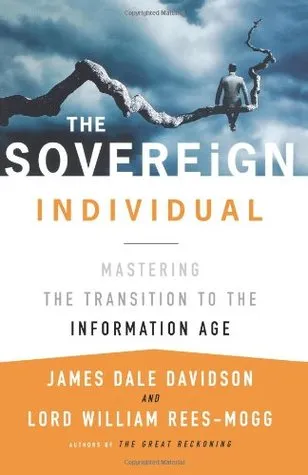Do you read? If you do, what do you read? Magazines? Books - fiction / non-fiction? Tweets?
Over the next few days I want to share some of the books that have had a big impact on me. Most are non-fiction. I don't find that many people in my daily life share the same interests or read the same type of books. My hope is that some other people out there have read the same books and we can have an interesting discussion about them. Of course I am sure there are many interesting books that you have read that I have yet to read and I am interested to hear some of your favorites.
First up: The Sovereign Individual by James Dale Davidson & William Rees-Mogg

https://www.goodreads.com/book/show/82256.The_Sovereign_Individual
This is one of my favorite books of all time. It's the type of book that makes predictions (always dangerous) about the future. It was published in 1999 and while the trends identified (computers/digital enterprise/networked communication) have continued to grow as predicted, the social changes forecasted have yet to really come to fruition (for the majority of the global population).
The central thesis of the book is that citizenship is going the way of the dodo bird; it won't last long in a global digital economy. In the modern nation, it is the state that is sovereign over its people - the citizens. While some nations provide some basic freedoms to their citizens - they are ultimately dependent on the state. Individual sovereignty is about placing the individual above other forms of control, including the government.
The problem with citizenship is that it's not well adapted to the 21st century. The authors make the comparison between citizenship and chivalry in the Middle Ages. Both are forms of social regulation well adapted to their respective historical realities. If you live in feudal England, you ought to conform to the rites of chivalry in order to maximize your chance of success (not being killed by the King or Lords). Similarly, the 20th century saw the growth of a new type of social organization - the modern industrial welfare state. To get along in that kind of society an individual needs to behave in certain ways - paying taxes and voting based on national boundaries. Just as chivalry eroded when the Renaissance and Enlightenment created new ways of being in the world, so too may citizenship erode if the digital information revolution means the nation-state has less meaning in our day-to-day lives.
I find this proposition exciting. It accords with what I observe in the world. We live in an era when it is possible to truly be a free individual. This book may give you some perspective on what that means.
What do you think? Have you read The Sovereign Individual? Have you read books that sound similar? What do you like to read?